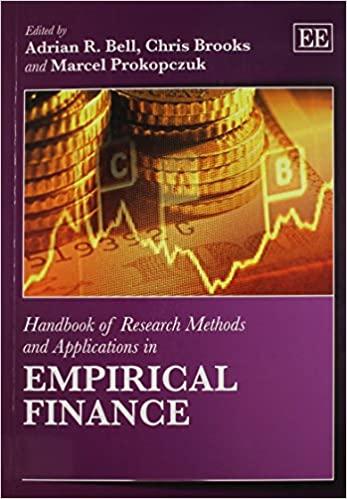Question
Instructions: 1. Round all dollar amounts to the nearest cent and dont enter the dollar sign. E.g. if the answer is $1,022.912, enter it as
Instructions: 1. Round all dollar amounts to the nearest cent and dont enter the dollar sign. E.g. if the answer is $1,022.912, enter it as 1,022.91 Commas dont matter, hence you can also enter 1022.91 2. Round all percentages to the nearest basis point and dont enter the percent sign. E.g. if the answer is 17.238%, enter it as 17.24, not 0.1724. In some (but not all) questions your answer is considered correct if it is within 1-2% range from the correct answer. This is to account for small rounding errors. Be careful not to make large rounding errors.
1. What is the future value of $400 saved at = 7.86%, compounded annually in 1 year?
2. What is the future value of $400 saved at = 7.86%, compounded annually in 2 years?
3. What is the future value of $400 saved at = 7.86%, compounded semi-annually in 2 years?
4. What is the future value of $400 saved at = 7.86%, compounded quarterly in 2 years?
5. Suppose you save $18,000 per year at an interest rate of = 5.21% compounded once per year. How much will you have after 35 years?
6. A risk-free bond will pay you $1000 in 1 year. The annual discount rate is = 3.69% compounded annually. What is the bonds present value?
7. A risk-free bond will pay you $1000 in 2 years and nothing in between. The annual discount rate is = 9.5% compounded annually. What is the bonds present value?
8. You buy a 30 year zero coupon bond which will pay you $1000 in 30 years at an annual yield of = 6% compounded once per year. A few minutes later the annual yield rises to = 7% compounded once per year. What is the percent change in the value of the bond? (Hint: the answer should be negative.)
9. You buy a 30 year zero coupon bond which will pay you $1000 in 30 years at an annual yield of = 14% compounded once per year. 25 years later it will be a 5 year zero coupon bond. Suppose the interest rate on this bond will be 14%, what will the price of this bond be in 25 years?
10. You are offered an annuity that will pay you $200,000 once per year, at the end of the year, for 25 years. The first payment will arrive one year from now. The last payment will arrive twenty five years from now. Suppose your annual discount rate is = 5.25%, how much are you willing to pay for this annuity? (hint: this is the same as the present value of an annuity.)
11. You would like to develop an office building. Your analysts forecast that it will cost you $1,000,000 immediately (time 0), and it will cost you $500,000 in one year (time 1). They forecast you can sell the building for $2,400,000 in two years (time 2). If your discount rate is = 25%, what is the net present value of this investment?
12. What is the IRR of the project in question 12? (hint: if you are using an ordinary calculator, all you need to do is to solve a quadratic equation).
13. You consider developing a rental apartment complex. It will cost you $1000,000 per year for the next 2 years to build it, and $20,000 per year for maintenance starting the third year. The revenue will be $152,000 per year. What is the NPV of this project if the interest rate is 6%, and your planning horizon is infinite?
14. What is the fraction of housing in the assets of a typical US household? (1) 10%, (2) 30 %, (3) 50%, (4) 75%. Syntax: if your answer is (1) 10%, enter 1, not (1), and not 10%. Comment: you never need to remember the exact numbers (numbers change, estimates vary, you can always look up), but it is useful to know the approximate magnitudes for qualitative understanding (e.g. 10% and 50% in this question imply very different qualitative characteristics of the housing market) and for back of the envelope calculations w/o looking up every single number.
15. How large was the decline in house prices during the housing bust of 2007-12? Pick the closest number: (1) 10%, (2) 30%, (3) 50%, (4) 75%.
Step by Step Solution
There are 3 Steps involved in it
Step: 1

Get Instant Access to Expert-Tailored Solutions
See step-by-step solutions with expert insights and AI powered tools for academic success
Step: 2

Step: 3

Ace Your Homework with AI
Get the answers you need in no time with our AI-driven, step-by-step assistance
Get Started


